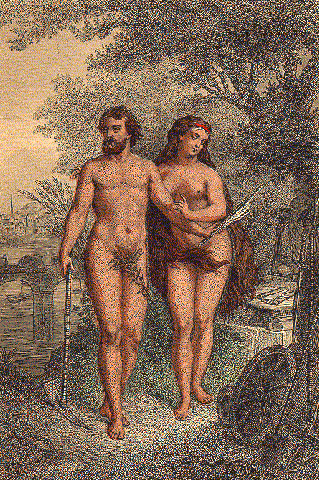 |
 |
 |
 |

1:27 So God created man in his own image, in the image of God created he him; male and female created he them.In the second version Eve is an afterthought, created from Adam's body and therefore subordinate to, an appendage of, her husband. In this account God thinks of her as Adam's "help meet," an "assistant" to him, not his equal. Adam, in turn, is allowed to name her at the end of his task of naming "every living creature," and he so names her that her emanation from himself becomes the principle of her very nature: wo-man. Then, upon the fall, he renames her as Eve. This control over her name and her existence provides the basis for the almost universal Western custom of women being named after the men to whom they belong.1:28 And God blessed them, and God said unto them, Be fruitful, and multiply, and replenish the earth, and subdue it: and have dominion over the fish of the sea, and over the fowl of the air, and over every living thing that moveth upon the earth.
2:15 And the LORD God took the man, and put him into the garden of Eden to dress it and to keep it.Milton, in his characterization of Eve, cannot merely ignore what the scriptural account provides his culture (see Paradise Lost IV.440, Eve's first utterance), but he shifts its emphases in signal ways. Eve's individuality and sense of selfhood is accentuated, whether it is in her account of her contemplating herself in the pool a few lines further into that initial speech (IV.449) or, in a remarkable departure from the scriptural text, the fact that she takes on the task of naming all the flora, as Adam names the fauna. Moreover, Adam himself acknowledges Eve's exceptional nature, in the famous passage (VIII.488) in which he recalls his first sight of her:2:16 And the LORD God commanded the man, saying, Of every tree of the garden thou mayest freely eat:
2:17 But of the tree of the knowledge of good and evil, thou shalt not eat of it: for in the day that thou eatest thereof thou shalt surely die.
2:18 And the LORD God said, It is not good that the man should be alone; I will make him an help meet for him.
2:19 And out of the ground the LORD God formed every beast of the field, and every fowl of the air; and brought them unto Adam to see what he would call them: and whatsoever Adam called every living creature, that was the name thereof.
2:20 And Adam gave names to all cattle, and to the fowl of the air, and to every beast of the field; but for Adam there was not found an help meet for him.
2:21 And the LORD God caused a deep sleep to fall upon Adam, and he slept: and he took one of his ribs, and closed up the flesh instead thereof;
2:22 And the rib, which the LORD God had taken from man, made he a woman, and brought her unto the man.
2:23 And Adam said, This is now bone of my bones, and flesh of my flesh: she shall be called Woman, because she was taken out of Man.
Grace was in all her steps, Heaven in her eye,Although the Creature in Frankenstein explicitly identifies himself with Adam (2.7.4), and exactly like Adam, appeals to his creator for a companion, more seasoned readers of Paradise Lost (who, unlike the Creature, do not read it in a French translation) have recognized many ways in which he is modelled also after Eve. The signal is his viewing himself in a pool and thereby discovering his monstrosity (2.4.5). The most salient point of comparison is that Eve, for many years after her creation, is unique, the only speaking creature in the universe who is not male. (Even in Genesis, we are never told at what point she at last bears a daughter, only that Cain, at the point of his exile into the land of Nod, has a wife: Genesis 4:17.) Also, long before feminism began to ask questions about the purport of the Genesis creation myth, some church fathers in their commentaries were moved to argue that Eve, as the last of created beings, had to have been designed to be the best: ironically, Victor Frankenstein's Creature is not only taller than ordinary human beings; he is also stronger, faster, better able to withstand what would be thought of as inhuman conditions. To be "super-human," whether like Eve or like the Creature, is, in its way, to stand out as monstrous.
In every gesture dignity and love.